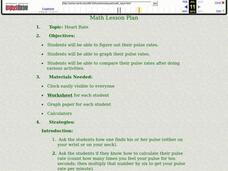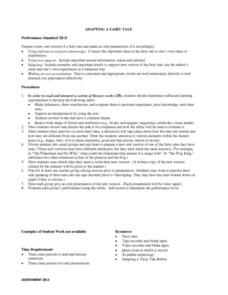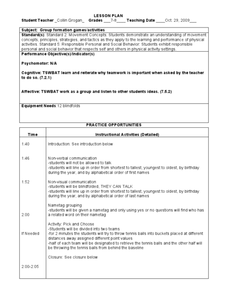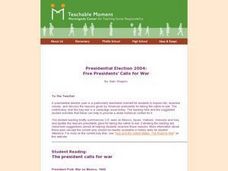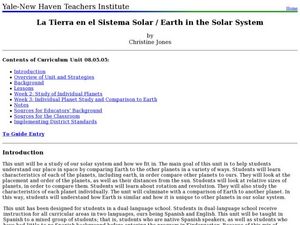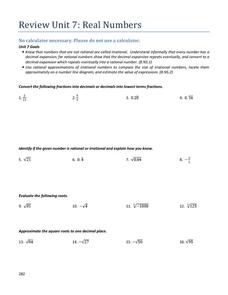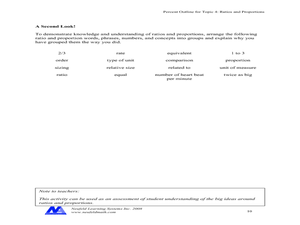Curated OER
Seed Sorting 101
Learners sort through numerous seeds to find similarities and differences. In this sorting and classifying lesson, students divide up different plant seeds based on their similarities and differences, while keeping record of their findings.
Curated OER
Graphing Heart Rates
Students take their pulse rates. In this graphing lesson, students take their pulse rates and graph them. Students do various physical activities and graph the differences in their pulse rates.
Curated OER
comparison of Two Gender Sports Teams
Learners gather data on sports team and create a box and whisper plot. In this data collection lesson, students find the median, the quartile range, and relationships between variables.
Curated OER
The Magic School Bus Lost in Space
Students identify the planets by making two models of the Solar System. They create a model that shows the order of the planets and a model that shows the planets sizes as compared to one another. They may write about the planet they...
Curated OER
Adapting a Fairy Tale
Learners read and prepare a new oral version of a selected fairy tale. They read and compare/contrast two fairy tales and identify the main story elements. In small groups they create a new oral version of one they fairy tales and...
Curated OER
Leadership: Communicating With Your Peers
Students explore communication by using non-verbal cues. In this body language lesson, students utilize blindfolds to communicate with classmates through words only, then use only physical actions to communicate and compare the two....
Curated OER
Theoretical Probability
In this math worksheet, students investigate the ratio comparing the number of ways an event can occur using theoretical probability.
Curated OER
Minerals
Students compare the two main groups of minerals. In this nutritional instructional activity, students learn which foods contain the best source of minerals needed to maintain good health. They study the minerals that are required to be...
Curated OER
Prints and Outlines
Students determine the area of two objects by superimposing one on the other. They compare and order the area of different shapes by covering a larger shape with similar smaller ones. They complete these activities as different stations.
Curated OER
Life and Times, Developing a Chronology
Students review the career and life of Ernie Pyle as an example of a biography in context. They consider how a chronology maps out the events in the life of an individual in the context of other events that were occurring at the same time.
Curated OER
Comparing Fractions
In this math worksheet, students solve the problems with fractions by comparing them with others. The sheet is intended as a teacher's guide.
Curated OER
Presidential Election 2004: Five Presidents' Calls for War
Learners examine five president's reasons for entering into a war. Using the text, they answer questions and discuss their answers with the class. They also examine President Bush's reasons for going to war in Iraq and how that...
Curated OER
Spoonfuls, Cupfuls and Handfuls
Explore the use of non-standard units for measuring volume with elementary learners. They fill a container and count the number used using cups, spoons, and bottles, build with blocks and count the number of blocks used, and compare and...
Curated OER
Earth in the Solar System
A three-week unit designed to be completed in an elementary level, dual-language immersion classroom, this resource includes several lessons intended to introduce young learners to the solar system, the Earth and how the Earth compares...
Computer Science Unplugged
Beat the Clock—Sorting Networks
Can multiple computers sort a list faster than one? Using a network drawn with chalk outside, groups move through the decision network to sort numbers. A series of extension questions come with the lesson and can be used in the same...
Charleston School District
Review Unit 7: Real Numbers
Provide pupils with problems to check their understanding of the concepts within the unit. The seven-part series of lessons covers concepts related to irrational numbers. Learners convert between fractions and decimals, estimate the...
Curated OER
Don't Be Tricked By Your Integrated Rate Plot
In this chemistry worksheet, students examine the given concept in order to apply in the laboratory setting. The sheet includes in depth background information.
Curated OER
How hard is it?
Inquiry is probably one of the most fun ways kids learn. They will test the hardness of 10 different minerals in order to classify them. They rate each of the minerals from most to least hard. Note: Having real minerals for this...
Neufeld Learning Systems
Concept: Ratios and Proportions
Upper elementary and middle school pupils fill out a chart creating six equivalent fractions and then compare them to six different objects and/or shapes. They group together 16 various terms related to ratios and proportions. Pupils...
Physics Classroom
All Work and No Play Lab
Don't let the term, "slotted wood board" detract you from the value of this experiment. Class members tie a string to a cart and, with even horizontal force, drag it up an inclined plane. The objective is to compare the work done with...
ARKive
Animal over Winter
Gosh those polar regions can get cold. So, how do the animals that live there survive the long winters? Learners explore how animals adapted to survive harsh wintry conditions by completing a worksheet and comparing animal survival...
Illustrative Mathematics
The Florist Shop
A real-world approach to common multiples asks learners to find different groups of flowers based on their multiples. Useable as a class activity or independent exercise, they will have to organize their thoughts to explain the totals of...
Virginia Department of Education
Analyzing and Interpreting Statistics
Use measures of variance to compare and analyze data sets. Pupils match histograms of data sets to their respective statistical measures. They then use calculated statistics to further analyze groups of data and use the results to make...
Concord Consortium
Yearbook Pictures
Sorting memories doesn't have to be difficult. Young mathematicians evaluate two different methods of sorting yearbook pictures. They answer a set of questions to explore each method, then develop their own sorting procedure based on...



